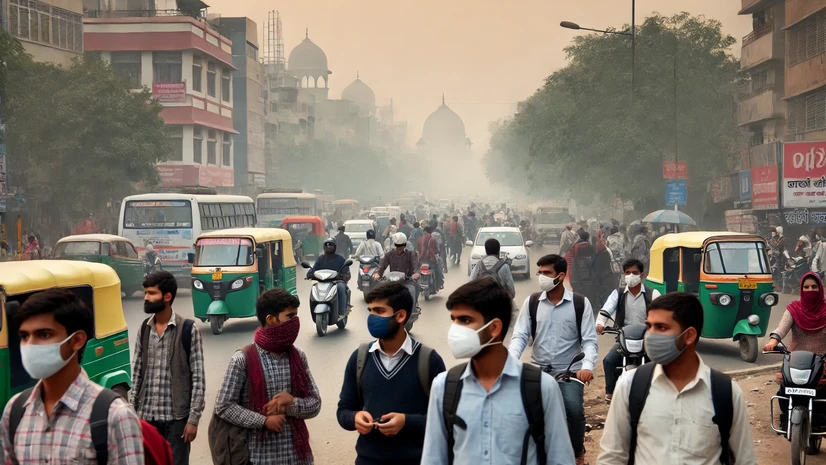The worsening air quality crisis greeted millions in Delhi and NCR on Monday morning, as the region’s pollution levels plunged into the ‘severe plus’ category on Sunday. The toxic air presents immediate and long-term health risks, increasing the likelihood of serious illnesses such as lung cancer, asthma, and pneumonia.
The government is trying to curb air pollution with a range of measures, from limiting the use of vehicles to ordering government offices to operate at 50 per cent capacity. Despite this, there has been no positive improvement in the air quality, as the government's short-term efforts are much smaller than the factors contributing to the pollution.
Air emergency in Delhi: AQI exceeds 1,500; smog halts life, schools closed
Let’s understand in detail how air pollution can harm the human body and what experts advised citizens and government to combat the deteriorating air quality in the capital city.
Effects of ‘severe plus’ air quality on human body
As AQI worsens, experts indicate that it impacts multiple organs, starting with the lungs, as pollutants enter the body through them. Acute effects include allergic rhinitis, nose irritation, headaches, and skin issues. Chronic exposure can lead to conditions like asthma, COPD, and even lung cancer.
“Ultra-fine particles (<0.1 micron) travel from the lungs into the bloodstream, triggering systemic effects. These particles harm the heart (causing hypertension, ischemia, and heart attacks, especially in winter), brain (leading to headaches, dementia, and compromised neurological development in children), kidneys, and even reproductive organs,” Dr Arup Halder, senior consultant pulmonologist, Department of Pulmonary Medicine, CMRI Hospital, told Business Standard.
Halder explained that in pregnant women, pollution can damage the placenta, disrupt foetal development, and cause lifelong epigenetic changes in the baby, contributing to adult-onset diseases. This reinforces the concept that many adult diseases originate in foetal life, with pollution playing a critical role.
More From This Section
“Even brief exposure to high AQI levels can cause long-term damage through epigenetic changes. Short-term exposure isn’t harmless — it can have lasting impacts, increasing health risks over time, particularly in colder months. Air pollution, thus, affects the entire body, far beyond the lungs,” he said.
Specific diseases can be caused by the air pollution
As per the experts, air pollution has far-reaching effects on various organs in the body. For the lungs, it can lead to conditions like allergic rhinitis, asthma, COPD, and lung cancer, as well as acute effects such as pneumonia and lung infections.
“In the heart, it contributes to hypertension, heart attacks, and heart failure. The brain is also affected, with links to cognitive decline, dementia, Alzheimer's disease, and even strokes. On the skin, air pollution can trigger different types of dermatitis,” Halder said.
It also impacts internal organs like the kidney and liver, potentially causing chronic kidney disease and chronic liver disease. In essence, almost every disease process can be influenced or exacerbated by the harmful effects of air pollution.
What can people do to save themselves at an individual level?
To reduce exposure to indoor pollution, there are several steps citizens can take at an Individual level. First, avoid smoking inside the house. Ensure that your rooms are well-ventilated, with good airflow and natural sunlight. It's best to avoid burning incense or using stoves indoors whenever possible, and the kitchen should be airy to allow fumes to disperse.
During the winter months, it suggested that to avoid morning walks early in the day. Instead, checking the Air Quality Index (AQI) before heading out is essential. If the AQI is good, it’s safe to go for a walk, but if it’s poor, it’s best to stay indoors. Walking or exercising in polluted air increases the amount of harmful particles we inhale, suggested experts.
The ideal time for outdoor activities during winter is between 9 am and 3 pm, when pollution levels are generally lower due to sunlight. Early mornings and evenings tend to have higher pollution levels.
For school-going children, wearing a mask during their commute is important, as they are more vulnerable to pollution, especially in the morning, when levels are higher. Their developing lungs are more susceptible to long-term damage.
If someone has existing lung issues, they should consult a doctor and use prescribed inhalers correctly. These are practical steps we can take to minimise the impact of pollution on our health.
‘We need a policy shift, temporary measures won’t work’
Experts emphasise that the government needs a fundamental change in policy regarding fossil fuels and road infrastructure to improve air quality on a large scale.
“India has a National Air Quality Programme (NAQP), but it needs to be implemented urgently. Air pollution is directly linked to the climate crisis, and we are already experiencing its effects. The climate crisis is not a future problem — it’s happening now. Therefore, we must implement the NAQP with a sense of urgency, treating it as a priority,” Halder said.
There is also a need to reduce dependency on fossil fuels and switch to electric vehicles. While some states are adopting this change, others are lagging behind. Extremely congested roads, particularly in metros, also contribute significantly to air pollution. Traffic congestion leads to increased emissions, as vehicles are forced to operate inefficiently. Improving road conditions and reducing congestion is crucial for tackling air pollution.
Experts highlight the need to implement an Air Quality Index forecast, similar to weather forecasts. This would help inform the public and guide actions based on real-time air quality data. Cities like Delhi already have graded action plans based on AQI levels, and there is a need to adapt such plans.
Additionally, experts believe that there is a need for more air quality monitoring stations across the country. Currently, India has too few, which limits understanding of the true extent of air pollution, especially in rural areas. Air pollution is now affecting villages as well, and it is needed to increase monitoring to better understand the problem and take effective action.

)